 Building a Peaceful Nation
Building a Peaceful Nation Published online by Cambridge University Press: 08 May 2021
Immediately following the resolution of the January 1964 mutiny, Nyerere made a speech calling on TANU Youth League (TYL) members to enlist in a new army that would replace the suddenly defunct Tanganyika Rifles. A few weeks later, during the first parliamentary session after the mutiny, Nyerere brought parallel bills for the establishment of a national labor union, NUTA, and the rapid expansion of the nascent National Service, Jeshi la Kujenga Taifa (JKT), or literally, “The Army to Build the Nation.” The legislation allowed the president to mobilize the JKT for military service, but most JKT activities involved articulating Ujamaa into action domestically, communicating TANU's ideology through the modernist rituals of military drills directed toward rural development rather than combat.
On January 30, 1964, a special committee met to brainstorm the creation of a new army. The committee recommended that all new recruits for the police or army should spend three months in the JKT, and that TYL youth should register in the JKT. Furthermore, they proposed that military training be introduced in all teachers’ colleges and some secondary schools, that national security awareness should be taught widely, and that some honorary military ranks be introduced “for those who have served the country.” They would develop an elite “commando” corps, promote the president to commander-in-chief with his own military uniform, incorporate the heads of security organs into the National Executive Committee of the party, and create a special commission for military grievances. They also suggested a dedicated military airport, emergency radio station, and the need to identify and secure national security assets, including water sources. They also floated the idea that the Tanganyika Electric Supply Company (TANESCO) and potentially other major industries be nationalized. Finally they proposed what came to be known as mgambo, a villagelevel military reserve.
The new army was trained as an explicitly politicized force, in contrast to the British tradition of a politically neutral force. British military historian Hew Strachan has argued that the dubious ideal of an apolitical military only applied once a modern British sovereign had been established above local politics sometime after the Glorious Revolution, and even then its vaunted neutrality was itself a political claim.
To save this book to your Kindle, first ensure [email protected] is added to your Approved Personal Document E-mail List under your Personal Document Settings on the Manage Your Content and Devices page of your Amazon account. Then enter the ‘name’ part of your Kindle email address below. Find out more about saving to your Kindle.
Note you can select to save to either the @free.kindle.com or @kindle.com variations. ‘@free.kindle.com’ emails are free but can only be saved to your device when it is connected to wi-fi. ‘@kindle.com’ emails can be delivered even when you are not connected to wi-fi, but note that service fees apply.
Find out more about the Kindle Personal Document Service.
To save content items to your account, please confirm that you agree to abide by our usage policies. If this is the first time you use this feature, you will be asked to authorise Cambridge Core to connect with your account. Find out more about saving content to Dropbox.
To save content items to your account, please confirm that you agree to abide by our usage policies. If this is the first time you use this feature, you will be asked to authorise Cambridge Core to connect with your account. Find out more about saving content to Google Drive.